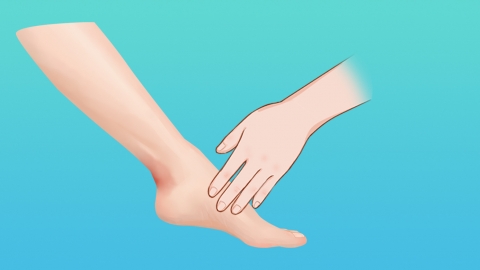How to recover quickly from a sprained and swollen ankle
Generally speaking, there is no such thing as a fastest way to recover from a sprained and swollen ankle. However, recovery can be facilitated through methods such as rest and immobilization, ice application to reduce swelling, compression bandaging, elevation of the injured limb, and medication. The specific measures are as follows:

1. Rest and immobilization: After spraining the ankle, stop all activity immediately to allow the injured ankle sufficient rest. Avoid walking or exercising further to prevent worsening the injury. The duration of rest depends on the severity of the sprain; mild sprains may require 1-2 days of rest, while severe sprains may require several weeks.
2. Ice application to reduce swelling: Apply ice within 48-72 hours after the injury. Ice helps constrict blood vessels, reducing local bleeding and thereby alleviating swelling and pain. Use an ice pack or ice wrapped in a towel. Apply for 15-20 minutes each time, every 1-2 hours. Avoid direct contact with the skin to prevent frostbite.
3. Compression bandaging: Wrap the injured ankle with an elastic bandage. The purpose of bandaging is to reduce swelling and provide additional support. Begin wrapping from the toes upward in a spiral manner. Ensure the bandage is not too tight, as this could impair circulation. Normally, the toes should appear pink and feel warm. If the toes turn purplish or feel cold, the bandage is too tight and should be loosened and reapplied.
4. Elevating the injured limb: Elevate the injured ankle as much as possible above heart level. This helps promote venous return and reduce swelling. While resting, place pillows or blankets under the foot to elevate it. At night, place a wedge-shaped cushion at the foot of the bed to keep the foot elevated, which helps reduce swelling during sleep.
5. Medication: Under a doctor's guidance, topical medications such as Compound Rhizoma Nardostachyos Pain-Relieving Plaster, Flurbiprofen Gel Patch, or Yunnan Baiyao Sprain & Trauma Aerosol may be used for promoting blood circulation to remove blood stasis, stopping bleeding, and relieving pain. Additionally, oral medications such as ibuprofen sustained-release capsules, muscle-relaxing and blood circulation-promoting tablets, or amoxicillin capsules may be taken as directed for anti-inflammatory and analgesic effects.
If swelling persists or symptoms worsen after an ankle sprain, seek medical attention promptly to determine whether there is a fracture, ligament damage, or other serious condition.








